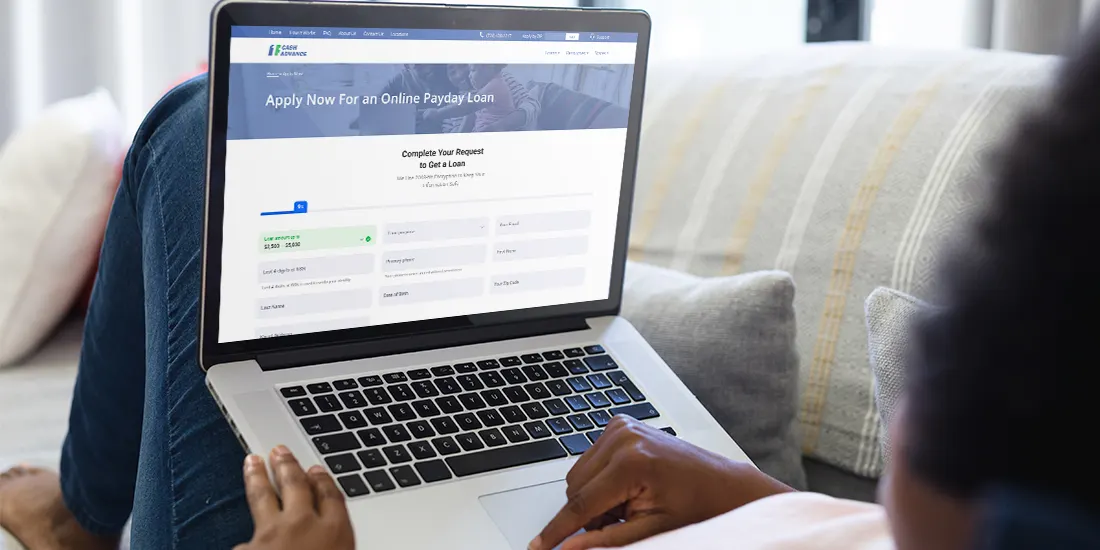
How to Fill out a Loan Application to Get Approved
8 Min Read
- Key takeaways
- What is the purpose of your loan application
- Typical loan approval requirements
- What do I need to apply for a loan?
- How to fill out a personal loan application
- How long does it take to get loan approval
- Tips for getting approved for a personal loan
- How 1F Cash Advance simplifies the loan application process
- FAQ
Key Takeaways
- Providing accurate and complete information in your application form speeds up the borrowing process and increases your approval chances.
- Before applying, make sure you meet the lender’s requirements and prepare all the supporting documents in advance.
- Factors like your credit score, income, and the overall financial situation highly affect whether a lender will approve you, even if your application is accurate.
Whether you need money to cover unexpected expenses, consolidate debts, or finance a wedding, a personal loan can be a smart option. But before you obtain one, you need to provide a lender with your personal and financial details to prove your reliability. To do this, you need to fill out a loan application form. This form serves as your brief profile and can speed up the process of getting a loan when completed accurately.
What Is the Purpose of Your Loan Application
Your loan application is a document that serves as a formal request for funds and contains the information lenders need to decide whether to give you a loan. It’s designed to help lenders assess your creditworthiness and ability to repay the borrowed amount on time. On top of that, your application details play a key role in risk assessment and directly affect your loan terms.
Typical Loan Approval Requirements
Each lender may set its own eligibility criteria, so it’s important to check out the specific requirements of the loan provider you’re going to deal with. Below are the typical categories that most lenders look at when evaluating your loan application:
Residency and age
US lenders can only offer personal loans to permanent residents who are at least 18 years old. Additionally, you need to live in the state where the lender is licensed to operate.
Credit score and history
Your credit score is a number from 300 to 850 that reflects your overall financial and credit behavior. It shows lenders how likely you are to repay the funds. Some loan providers require a credit score of at least 680, while others set no minimum requirements. Still, the higher your rating, the better the loan terms you can get.
Income and employment
Lenders want to ensure you earn enough to manage your loan payments. They may also look at your employment stability, typically for the last 2 years, to assess the potential risks of inconsistent income.
Debt-to-income (DTI) ratio
While you may have a high income, loan providers also look at how much of the amount you earn goes toward your existing debts. A DTI of up to 43% is typically needed to get approved.
Bank account
In most cases, you need to have an active bank account in your name to receive your loan funds and set up automatic payments. While some loan providers may offer cash loans, your options will be quite limited and are likely to have less favorable terms.
What Do I Need to Apply for a Loan?
Once you ensure you meet the lender’s requirements, you need to attach supporting documents that will prove the information you provided in your application form. Here’s the common list of items and information you typically need to bring:
- Valid government-issued photo ID
- Social Security number
- Bank account and routing numbers
- Proof of income (pay stubs, bank statements, W-2s, tax returns)
- Proof of address (rent or lease agreement, mortgage statement, utility bills)
- Personal and contact details (full name, email, cell phone number)
- Your employer’s contact information
How to Fill out a Personal Loan Application
The application process can differ by lender, but typically involves the following simple steps:
- Gather all the information and documents. Check out the lender’s website and get all the required items and details ready to complete the process faster.
- Determine your loan amount and purpose. Make sure the lender allows using a personal loan for what you want, and calculate how much money you need to cover the cost.
- Choose a repayment period. Use a loan calculator to estimate your monthly payments and total interest paid over different payback times. Then, pick a period that balances both your loan payments and the total cost of borrowing.
- Complete the application form. The most convenient way to apply is by filling out a form on the lender’s website. However, some loan providers may require you to visit their physical location to complete the process. Enter all the needed data in the corresponding fields accurately and completely. Double-check the information provided and press “Submit.”
How Long Does It Take to Get Loan Approval
The speed of the underwriting process depends on the lender and the requested amount. Small loans are usually processed faster, while larger options may require extra assessment. Another factor that affects approval times is whether the lender performs a hard credit check. This procedure involves reviewing your credit profile via major credit bureaus, which typically takes longer compared to soft checks via alternative means.
At 1F Cash Advance, approval typically takes about 5 minutes due to no hard credit check involved. Traditional loan providers may need 1-3 days to evaluate your creditworthiness.
Tips for Getting Approved for a Personal Loan
An accurately filled-out loan application is not enough to qualify for a loan. Here are a few smart tips you can use to increase your approval chances.
Review Your Credit Reports
Your credit score directly affects both your likelihood of getting a loan and the terms the lender will offer. Make sure your credit reports contain no inaccuracies by reviewing them regularly. You can request free copies of your credit reports from each of the three major credit bureaus once a year.
Lower Your Credit Utilization and DTI
If possible, pay off your credit cards with high outstanding balances to keep your credit utilization below 30% of the available limits. Aim for a DTI of below 43% to show lenders you can handle your debts without overburdening your budget.
Demonstrate a Steady Income
Your income plays a significant role in your application, especially if your credit is bad or limited. Verify all your income sources to show lenders you can repay what you borrow on time.
Provide Collateral
If a lender still rejects you due to bad credit or insufficient income, consider obtaining a secured loan. Adding collateral, such as your car, house, or a savings account balance, to your application provides a lender with a repayment guarantee, making them more willing to approve you.
Bring a Co-signer
A co-signer is an individual, typically your family member or close friend, who will be responsible for repaying a loan if you default. Before applying for a joint loan, assess all the risks carefully. Keep in mind that late payments may affect both your and your co-signer’s credit and finances.
How 1F Cash Advance Simplifies the Loan Application Process
At 1F Cash Advance, we strive to make the entire loan process as simple and straightforward as possible. We skip all the complexities associated with traditional bank loans and move the application process online. This means you can complete our loan request from the comfort of your home, no matter your location. Our form does not contain any unnecessary questions, making it possible to fill it in as little as 5 minutes.
Besides the ability to apply completely online, 1F Cash Advance simplifies the underwriting process by eliminating a hard credit check via major credit bureaus. Instead, we estimate your overall financial situation via alternative credit reporting agencies and third-party means. This reduces processing times and increases approval chances for people with less-than-perfect credit scores.
FAQ
Why do I need to specify the purpose of my loan?
While personal loans can be used for a wide range of needs, several restrictions may apply. If you take out a personal loan for a home down payment, tuition costs, business expenses, or illegal activities, lenders are likely to reject your application. Your loan purpose may also affect your interest rate and terms, especially if you obtain the funds to deal with existing debts or are considered a risky borrower for any other reason.
What do I need to consider before taking out a loan?
Before applying, compare offers from different lenders and pay attention to the requirements, terms, APRs, extra fees, and any other factors that will affect your repayment. Most lenders now allow you to pre-qualify for a loan and assess your potential terms without any impact on your credit score.
How can I speed up the application process?
The key thing that helps you apply for a loan faster is to prepare all the required information and documents in advance. You can also reduce processing times by providing accurate and complete information in your loan request form.
Can I apply for a loan if I’m self-employed?
It depends on the lender’s policies. At 1F Cash Advance, we accept applications from self-employed individuals if they can provide proof of stable income. Some traditional loan providers may require official employment or offer less favorable loan terms to the self-employed. Read about loan options for gig workers.
Get approved for your loan today!Apply


